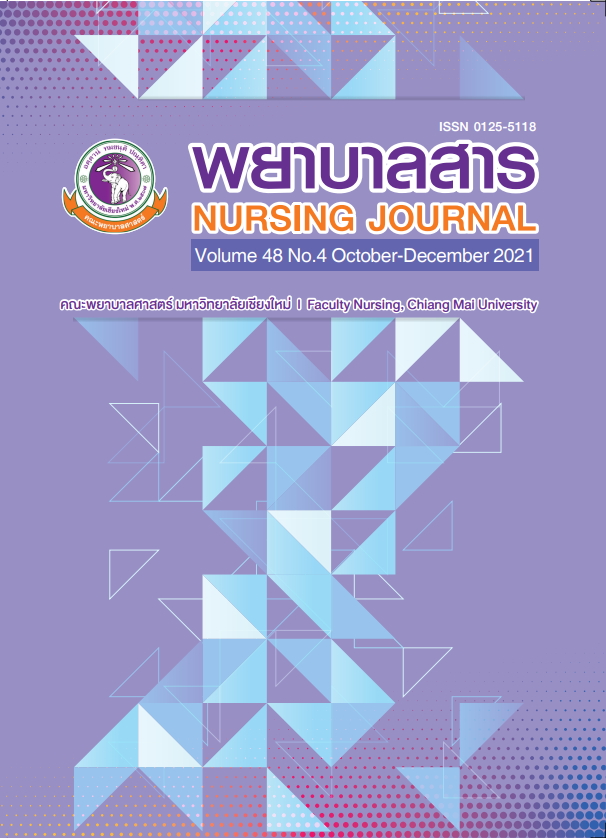การปฏิบัติกิจกรรมทางศาสนาและความผาสุกทางจิตวิญญาณในผู้สูงอายุที่เป็นโรคความดันโลหิตสูงที่ควบคุมไม่ได้
คำสำคัญ:
ความผาสุกทางจิตวิญญาณ, การปฏิบัติกิจกรรมทางศาสนา, ผู้สูงอายุโรคความดันโลหิตสูงที่ควบคุมไม่ได้บทคัดย่อ
โรคความดันโลหิตสูงที่ควบคุมไม่ได้เป็นปัญหาสุขภาพที่สำคัญ และสามารถทำให้ เกิดภาวะแทรกซ้อนที่รุนแรงในผู้สูงอายุ ส่งผลต่อจิตวิญญาณโดยนำไปสู่ความรู้สึกผิด เศร้าโศก วิตกกังวล การสนับสนุนทางด้านจิตวิญญาณจึงมีความสำคัญต่อการเผชิญหน้ากับโรคเรื้อรัง การปฏิบัติกิจกรรมทางศาสนาเป็นการส่งเสริมความผาสุกทางจิตวิญญาณ การวิจัยเชิงพรรณนาหาความสัมพันธ์ครั้งนี้ มีวัตถุประสงค์เพื่อศึกษาความผาสุกทางจิตวิญญาณ การปฏิบัติกิจกรรมทางศาสนา และความสัมพันธ์ของการปฏิบัติกิจกรรมทางศาสนาและความผาสุกทางจิตวิญญาณในผู้สูงอายุที่เป็นโรคความดันโลหิตสูงที่ควบคุมไม่ได้ ที่มารับการตรวจรักษาที่โรงพยาบาลส่งเสริมสุขภาพตำบลบ้านศรีบุญเรือง ตำบลหนองหอย และศูนย์บริการสาธารณสุขเทศบาลตำบลสุเทพ จังหวัดเชียงใหม่ จำนวน 88 ราย โดยเลือกกลุ่มตัวอย่างตามความสะดวก เครื่องมือที่ใช้ในการวิจัย ประกอบด้วย แบบสอบถามข้อมูลส่วนบุคคล แบบประเมินความผาสุกทางจิตวิญญาณของผู้สูงอายุไทยที่เจ็บป่วยด้วยโรคเรื้อรัง และแบบวัดการปฏิบัติทางพุทธศาสนา วิเคราะห์ข้อมูลโดยใช้สถิติเชิงพรรณนา และวิเคราะห์หาสัมประสิทธิ์สหสัมพันธ์แบบเพียร์สัน ผลการวิจัยพบว่า ความผาสุกทางจิตวิญญาณและการปฏิบัติกิจกรรมทางศาสนาในผู้สูงอายุที่เป็นโรคความดันโลหิตสูงที่ควบคุมไม่ได้อยู่ในระดับสูง การปฏิบัติกิจกรรมทางศาสนามีความสัมพันธ์ทางบวกกับความผาสุกทางจิตวิญญาณในระดับปานกลาง อย่างมีนัยสำคัญทางสถิติที่ระดับ .01 (r=0.30) ผลการวิจัยครั้งนี้เป็นประโยชน์สำหรับบุคลากรสุขภาพในการส่งเสริมการปฏิบัติกิจกรรมทางศาสนาและความผาสุกทางจิตวิญญาณให้กับผู้สูงอายุที่เป็นโรคความดันโลหิตสูงที่ควบคุมไม่ได้
เอกสารอ้างอิง
Apinanmahakul, A. (2012). Thai society and religious donations and activities. Faculty of Economic Development National Institute of Development Administration. (in Thai)
Arampharat, P. (2013). People's participation in Buddhist activities, case study, Thawi Watthana District, Bangkok Province. Veridian E-Journal, 6(1). 457-478.
Bhanthumnavin, D. (1997). Buddhist beliefs and practices of Thai people: Cultivation, training and quality of life. Bangkok: National Institute of Development Administration. (in Thai)
Boonruangrat, C. (2008). Spiritual well-being and happiness of the elderly in the Center for
the Development of Social Welfare for the Elderly at Ban Bang Khae. Bangkok:
Chulalongkorn University. (in Thai)
Bureau of Epidemiology, Department of Disease Control, Ministry of Public Health. (2012). Report on the Surveillance of Chronic Non-Communicable Diseases, 2012. Chronic Disease Surveillance Report, 2012. Retrieved from http://www.boe. moph.go.th /files/report/20140109_40197220.pdf
Burn, N., & Grove, S. K. (2009). The practice of nursing research: Conduct, critique & utilization (5th ed.). Philadelphia: Elsevier.
Calhoun, D. A., Jones, D., Textor, S., Goff, D. C., Murphy, T. P., Toto, R. D., ... Ferdinand, K. (2008). Resistant hypertension: diagnosis, evaluation, and treatment a scientific statement from the American Heart Association Professional Education Committee of the Council for High Blood Pressure Research. Hypertension, 51(6), 1403-1419.
Chaichanavirot, U. (2000). Relationships between family relationships, Health status, meditation practice and spiritual well-being of the elderly (Unpublished master’s thesis). Burapha University, Thailand. (in Thai)
Chiang Mai Provincial Public Health Office. (2016). Developing a chronic non-communicable disease service system in 2016. (in Thai) Retrieved from http://www.chiangmaihealth.go.th/cmpho_web/
Edmondson, K. A., Lawler, K. A., Jobe, R. L., Younger, J. W., Piferi, R. L., & Jones, W. H. (2005). Spirituality predicts health and cardiovascular responses to stress in young adult women. Journal of Religion and Health, 44(2), 161-171.
Hypertension Association of Thailand. (2012). Guidelines for the treatment of hypertension in general practice, B.E. 2012 (1st ed.). Bangkok: Hua Nam Printing.
Kahn, R. L., Goldfarb, A. I., Pollack, M., & Peck, A. (1960). Brief objective measures for the determination of mental status in the aged. American Journal of Psychiatry, 117(4), 326-328.
Kanthamun, N. (2003). Spiritual well-being of the elderly with lung cancer (Unpublished master’s thesis). Chiang Mai University, Thailand. (in Thai)
Kretchy, I. A., Owusu-Daaku, F. T., & Danquah, S. A. (2014). Mental health in hypertension: Assessing symptoms of anxiety, depression and stress on anti-hypertensive medication adherence. International Journal of Mental Health Systems, 8(1), 1-6.
Kwanyuen, N. (2008). Religious activities of Buddhist immigrants in Urban Areas: A community case study. one in Bangkok (Unpublished master’s thesis). Chandrakasem Rajabhat University, Thailand. (in Thai)
National Health Commission Office. (2007). Clinical practice guideline diabetes, high blood pressure chronic obstructive pulmonary disease. Retrieved from https://www.nationalhealth.or.th/index.php/en/node/1407
Noipiang, T. (2001) Perceived severity of illness, social support and well-being psychology in breast cancer patients (Unpublished master’s thesis). Chiang Mai University, Thailand. (in Thai)
Nwankwo, T., Yoon, S. S., Burt, V., & Gu, Q. (2013). Hypertension among adults in the United States: National Health and Nutrition Examination Survey, 2011-2012. NCHS data brief, 133, 1-8.
O’Brien, M. E. (2008). Spirituality in nursing: Standing on Holy Ground. Philadelphia: Jones and Bartlett.
Praiwan, C. (1997). Relationships between personal factors, religious practices, nursing caring behaviors, and spiritual welll-being of aids patients in Bumrasnaradura Hospital. Bangkok: Chulalongkorn University. (in Thai)
Puchalski, C. M. (2001). The role of spirituality in health care. Proceedings Baylor University. Medical Center, 14(4), 352. (in Thai)
Rakhab, A., Thaniwattananon, P., Nilmanat, K., & Apichato,A. (2007). Practicing dharma. perceived health status and hope in people living with HIV. Songklanagarind Medical Journal, 25(4), 259-271. (in Thai)
Rujipairote, P. (2007). The relationship between spiritual well-being, social support and perceived severity of illness and mental health self-care behaviors in breast cancer patients (Unpublished master’s thesis). Mahidol University, Thailand. (in Thai)
Somdet Phra Yannasangwon Patriarch Sakol Maha Sangkha Parinayok. (2013). Methods for creating merit. (in Thai) Retrieved from http://www.openbase.in.th/files/ebook/
sangh/set5/sangharajad019.pdf
Soowit, B., Panasakulkan, S., & Muksiritipanun, B. (2015). The assessment of the suffering
symptoms in palliative care patients. Songklanagarind Journal of Nursing, 35(1), 153-164. (in Thai)
Tantitrakul, W. (2009). Factors related to spiritual well-being of terminally ill cancer patients. Journal of Thai Traditional and Alternative Medicine, 2(3), 27-35. (in Thai)
Unsanit, P., Sunsern, R., Kunsongkeit, W., O’Brien, M. E., & McMullen, P. C. (2012). Development and evaluation of the Thai Spiritual Well-Being Assessment Tool for elders with a chronic illness. Pacific Rim International Journal of Nursing Research, 16(1), 13-28.
Wiangchai, P. (2015). Physiological response to stress. (in Thai) Retrieved from http://biology. ipst.ac.th/ ?p=2767
World Health Organization. (2013). Health services-statistics. Retrieved from www.who.int/ research/en
ดาวน์โหลด
เผยแพร่แล้ว
รูปแบบการอ้างอิง
ฉบับ
ประเภทบทความ
สัญญาอนุญาต
บทความที่ได้รับการตีพิมพ์เป็นลิขสิทธิ์ของวารสารพยาบาลสาร
ข้อความที่ปรากฏในบทความแต่ละเรื่องในวารสารวิชาการเล่มนี้เป็นความคิดเห็นส่วนตัวของผู้เขียนแต่ละท่านไม่เกี่ยวข้องกับมหาวิทยาลัยเชียงใหม่ และคณาจารย์ท่านอื่นๆในมหาวิทยาลัยฯ แต่อย่างใด ความรับผิดชอบองค์ประกอบทั้งหมดของบทความแต่ละเรื่องเป็นของผู้เขียนแต่ละท่าน หากมีความผิดพลาดใด ๆ ผู้เขียนแต่ละท่านจะรับผิดชอบบทความของตนเองแต่ผู้เดียว






